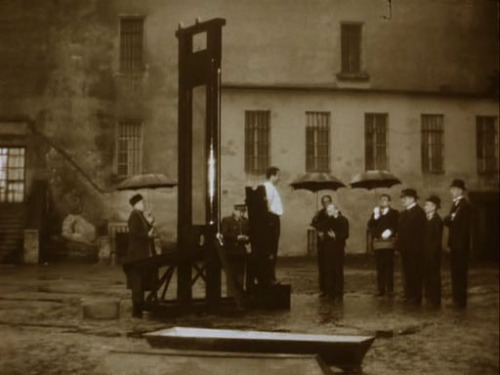by Allan Fish
(Czechoslovakia 1967 71m) not on DVD
Aka. Stastny konec
The End
p Milos Stejskal d Oldrich Lipsky w Milos Macourek, Oldrich Lipsky ph Vladimir Novotny ed Miroslav Hajek m Vlastimil Hala art Karel Skvor
Vladimir Mensik (Bedrich Frydrych), Jaroslava Obermeierova (Julia), Josef Abrham (Birdie), Bohus Zahorsky (Tchán), Stella Zázvorková (Tcyhné), Jaroslav Stercl (Stráznik), Helena Ruzicková (Cernovláska), Vladimir Cech (Kat), Josef Hlinomaz (Komisar), Martin Ruzek (Zalobce), Bedrich Prokos (Knez), Merko Musil (Dozorce), Lena Birková (Zajicová),
Cue opening credits. Konec. The End. Right, that was short and sweet. Or not. The idea of narratives going in reverse was in fashion at the turn of the century, with Memento and Peppermint Candy. A few years ago there was the The Curious Case of Benjamin Button, with not a narrative but a life in reverse. Oldrich Lipsky’s film, however, goes beyond any of these, like Memento multiplied by ten to the power of infinity and scripted by Spike Milligan. In Happy End the whole film is played in reverse, literally backwards, so characters go back in, rather than come out, jump from in the water to the jetty rather than jump into the water and lovers come back to life from being dead in the street and jump through the upstairs window rather than gets thrown out of it and killed. As for dialogue, answers come before questions, which come before the previous answer. So one early exchange goes “one…has he got any children?…five seventeen…what’s the time?” You’ll need a clear head for this one.
When we first see our hero born, it’s just his head, which we then see is separated from his body and ascertain that he’s been guillotined. We watch him receive rather than lose his head, be unbeheaded. Another conversation – centring round his final words from the priest and offering the condemned a last cigarette – goes “be brave my son. You’ll meet our lord…that’s disgusting…one last cigarette?” The premise is thus set up of his birth from death and his childhood spent in prison and such pastimes as returning food (imagine a canteen hand out done backwards) and unsealing sacks. His happy childhood ends when he’s taken to court and sent to be married (actually his trial for murder). He meets his wife who’s in a suitcase (dismembered) and takes her to his new home where he assembles her in the bath, puts her back together to the strains of ‘the Thieving Magpie’ and then she finally starts speaking.
It gets better. They have a child, Pavlinka, but the hero couldn’t remember when (“did I just not notice?” he asks). She’s very clever and can produce money from a small fire (think about it). His wife meets a lover, again in reverse, and they lose their child (assumedly disappearing back into his mother, whose stomach becomes deflated, like the balloons they suck the air out of). His wife and her lover visit the zoo, where they are tossed fish by seals and hippos give them entire loaves from their mouths. The hero, watching on, sees the lover as the bounder as he is; “to steal from a bank is OK, but to pauperise a hippo!” Talking of food, eating becomes producing food from magic mouths, empty plate becomes full plate. Still it gets better; at the point the child ‘dies’ we next see a funeral, but it’s not the child’s funeral, of course, but his father-in-law, who’s first seen in his coffin, from which he hatches to life. Then of course there’s the wedding night – “it wasn’t easy to return her virginity” – and the dressing of the bride.
So it goes on. It’s tiring to watch, trying to keep up with the talk being the wrong way round, not to mention the actual visuals. But it’s an inspired farce where the actors are literally just pawns in the director’s hand (though Mensik’s deadpan commentary is priceless). Everything is in the script and in the premise, and they deliver handsomely. Happy End is one of the supreme Czech whimsies, blackly comic and a miracle of screenwriting. Lipsky isn’t unknown in the west as his Lemonade Joe attracted some not unwarranted attention, but Happy End is the keeper.


